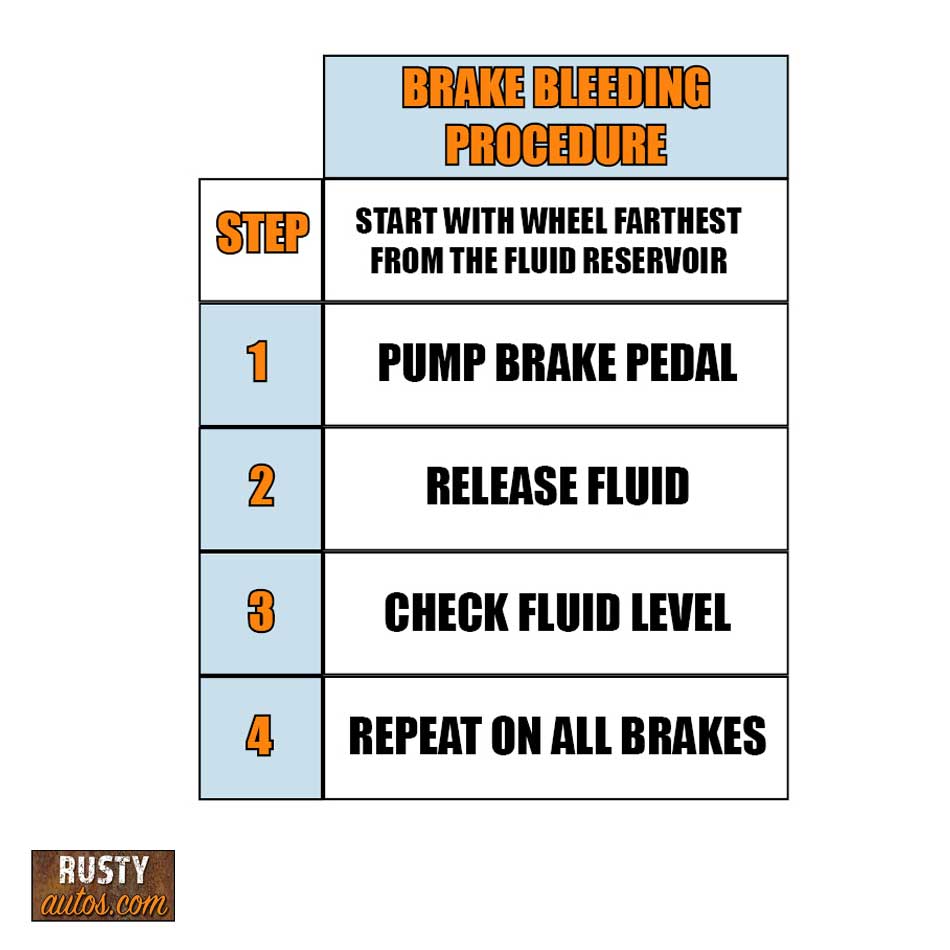Your brakes work on fluid pressure. The more the brakes are used the hotter the components in the braking system including the brake fluid.
 Spongy Brakes After Bleeding 100 Fix Rustyautos Com
Spongy Brakes After Bleeding 100 Fix Rustyautos Com
If the level of brake fluid in the master cylinder is low buy the proper brake fluid for your vehicle and add fluid to the Full line on your master cylinder.

Brakes are spongy and need to be pumped. Sounds like your brakes need priming so there may be a blockage in the brake fluid like that is causing pressure loss between brake use if you have to pump it to get the pressure. More than anything you need to purge the air from the brake system with what is known as bleeding the brakes Step 1. When the brake fluid gets hotter it turns from a thicker liquid to a thinner runny liquid.
Low Brake Fluid Level. In doing so the pedal should become firmer with each gentle press of the pedal. If the braking system isnt able to build up the pressure necessary to operate the system your pedal will feel strange.
Air in the brake lines is one of the most common causes of spongy brakes. I have a 2018 JLUR no lift w35 tires 9k miles. A soft brake pedal.
If its low top it off to the mark on the side of the reservoir. The cause of brake pump is the fluid expanding past the reservoir diaphragms capacity for expansion the fluid then has nowhere to go except for pushing the caliper pistons out giving that pumped. Braking systems rely on evenly distributed hydraulic pressure to bring vehicles to a halt.
Air in any of these lines can throw off this balance of pressure. When you press the brake pedal the master cylinder sends fluid into the lines creating pressure. Brakes are spongy and need to be pumped at times.
Sometimes your brakes will still work but they seem to have grown weak. In some cases it will be spongy and soft. Poor pressure can result in more time distance andor effort to stop.
With a thicker liquid the brake master cylinder needs less force to pressurize it in order to operate the brakes. If the brakes are soft or spongy this is a good time to change or flush the brake fluid. Check your brake fluid.
Over the course of the past few weeks my brake pedal has gone from a firm pedal that engaged the brakes at the tiop of the pedals movement to having lots of travel and the brakes engage when. The most common reason for a soft brake pedal is simply air still in the system. Your first reaction to encountering spongy brakes should be to rapidly pump the brake pedal with your foot.
Im experiencing a somewhat soft brake pedal unless I pump it a second time then the brakes feel very firm and responsive as they should. On the second pump the pedal travel is much less than the first attempt when coming to a stop and the brakes feel very good. The pedal may also feel more squishy than usual.
Clamp the brake flexsys off one at a time and try the pedal between clamping if the pedal is ok after camping one off then the problem is in the last one you clamped. How to Fix Spongy Brake Pedal 1 Pump the Brake Pedal Gently. This can be due to a number of problems.
A leak in a brake line a loss of pressure within the master cylinder itself due to a failed seal or air being introduced into the braking system. Bleeding the brakes uses fluid to push air out of the brake system Over time brake fluid absorbs moisture. This issue could be that the rear brake drum is not being adjusted over prolonged periods of time and use.
In others youll have to pump the brakes. Pedal stays firm in the braking zones but goes soft again after anything longer then a 10 sec interval off the brakes. Spongy brakes are a result of air getting into the brake system which can happen from leaks in the lines too little fluid in the system or the replacement of a part like a caliper that opened up a brake line.
The easiest way to diagnose this problem is to pump the brake pedal gently a few times. Rear brake shoe adjustment If your car and vehicle has a rear brake drum and pumping the brake pedal improves the pedal then the braking drum might be damaged or out of adjustment form common use resulting in a soft brake pedal. If pumping the pedal makes the car stop when the pedals higher up either a brake adjustment is in order or you need more brake fluid.
It takes longer to stop or you get less braking power when you apply the brakes suddenly. If it does then the obvious approach of bleeding the brakes must commence. If you are not sure whether this is the air that causing the brake pedal to become soft the best thing you can do to become certain about the cause is that you pump the brake pedal gently consecutively for a number of times if you feel the pedal is becoming firmer then it is sure the air is the real culprit.
Weak or Spongy Brakes. Flushing the brake fluid commonly called bleeding the brakes gets rid of the air. If the pedal is the same with all clamped then its probably the master cyl.
Need to lightly pump the brake with my left foot on the straights to have a firm pedal. Master cylinder resevoirs are full and there are no apparent - Pontiac 1979 Firebird question.